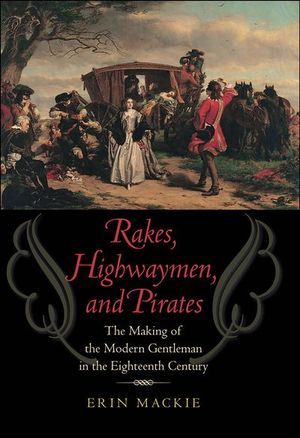Rakes, Highwaymen, and Pirates
Published by Johns Hopkins University Press
A study of the depiction and development of masculine figures in eighteenth-century British literature.
Erin Mackie explores the shared histories of the modern polite English gentleman and other less respectable but no less celebrated eighteenth-century masculine types: the rake, the highwayman, and the pirate.
Mackie traces the emergence of these character types to the seventeenth and early eighteenth centuries, when traditional aristocratic authority was increasingly challenged. She argues that the development of the modern polite gentleman as a male archetype can only be fully comprehended when considered alongside figures of fallen nobility, which, although criminal, were also glamorous enough to reinforce the same ideological order.
In Evelina’s Lord Orville, Clarissa’s Lovelace, Rookwood’s Dick Turpin, and Caleb Williams's Falkland, Mackie reads the story of the ideal gentleman alongside that of the outlaw, revealing the parallel lives of these seemingly contradictory characters. Synthesizing the histories of masculinity, manners, and radicalism, Rakes, Highwaymen, and Pirates offers a fresh perspective on the eighteenth-century aristocratic male.
“In this well-researched study, Mackie makes a strong case for the inclusion of alternative, criminal masculinities in understanding the development of the modern English gentleman and patriarchy in the eighteenth century. Situated at the nexus of gender theory and literary studies, her book adds to the study of modern and late modern cultural norms of gender and sexuality through discourse analysis of literary and nonliterary texts.” —Srividhya Swaminathan, Journal of British Studies
“The topic is lively, the writing clear, and the argument persuasive. Bringing together histories of criminality, of gender, and of manners cuts across the period in a new way that promises to produce lively debate.” —James Thompson, University of North Carolina at Chapel Hill
“The central concern of this book is the transformation of the “British gentleman” from the so-called Glorious Revolution through reformulations of patriarchy as exhibited in taste, sensibility, and virtue in the 18th century and beyond.” —Choice
Erin Mackie explores the shared histories of the modern polite English gentleman and other less respectable but no less celebrated eighteenth-century masculine types: the rake, the highwayman, and the pirate.
Mackie traces the emergence of these character types to the seventeenth and early eighteenth centuries, when traditional aristocratic authority was increasingly challenged. She argues that the development of the modern polite gentleman as a male archetype can only be fully comprehended when considered alongside figures of fallen nobility, which, although criminal, were also glamorous enough to reinforce the same ideological order.
In Evelina’s Lord Orville, Clarissa’s Lovelace, Rookwood’s Dick Turpin, and Caleb Williams's Falkland, Mackie reads the story of the ideal gentleman alongside that of the outlaw, revealing the parallel lives of these seemingly contradictory characters. Synthesizing the histories of masculinity, manners, and radicalism, Rakes, Highwaymen, and Pirates offers a fresh perspective on the eighteenth-century aristocratic male.
“In this well-researched study, Mackie makes a strong case for the inclusion of alternative, criminal masculinities in understanding the development of the modern English gentleman and patriarchy in the eighteenth century. Situated at the nexus of gender theory and literary studies, her book adds to the study of modern and late modern cultural norms of gender and sexuality through discourse analysis of literary and nonliterary texts.” —Srividhya Swaminathan, Journal of British Studies
“The topic is lively, the writing clear, and the argument persuasive. Bringing together histories of criminality, of gender, and of manners cuts across the period in a new way that promises to produce lively debate.” —James Thompson, University of North Carolina at Chapel Hill
“The central concern of this book is the transformation of the “British gentleman” from the so-called Glorious Revolution through reformulations of patriarchy as exhibited in taste, sensibility, and virtue in the 18th century and beyond.” —Choice
BUY NOW FROM
COMMUNITY REVIEWS

